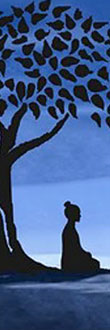|
|
| 'Like' us on Facebook | Follow us: |
Posted on: Feb 19, 2013
Fear of Losing …
"I" and "My" Syndrome
by Dr. Sara Pavan
Born in Malaya (now Malaysia) in 1938 and educated in Ceylon (now Sri Lanka), Dr. Sara Pavan graduated from University of Ceylon with MBBS in 1962. Since his marriage to Dr. Devi in 1965 he started a life of learning, travelling and broadening his horizons, commencing in Singapore. He specialised in Anaesthesia in England in January 1969. The couple lived in several countries including New Zealand and Australia.
The Pavans have been devotees of Swami since 1980 and had actively worked for the Sai organisation in Australia. He was the editor of the quarterly Australian Sai Newsletter 10 years from its inception. The couple moved to Prasanthi Nilayam in 1993 and have served in Swami’s hospitals since then.
 |
 |
 |
 |
 |
 |
 |
 |
Possessiveness is a feeling of 'ownership' of people and material things. Individuals with such feelings suffer from anxiety and harbour fear of losing them - kith and kin, worldly possessions and the like. Fear is a mentally created worry, a negative emotion. Possessive individuals are generally fearful and prone to be jealous of others. To overcome this, one has to develop detachment, stoke a smoking furnace of self-enquiry, get some spiritual knowledge from scriptures, gain wisdom through personal experiences and accept loss. Without God's grace one cannot achieve this state.
Our perceived success in life is based on criteria brought from our upbringing. Worldly success - material, intellectual, professional, is evinced by acquisition of more and more of them and holding on to them. We also develop a possessive feeling towards our children, spouse, friends, students, employees, etc. These are manifestations of ego - I and mine, the cause of all suffering.
Undue attachments and emotional ties cause pain and suffering. We personalise everything in our life unwittingly and hold on to them as ours. Events may seem to go well for a while and later beset with obstacles and disappointments. We may lose some possessions and even people we cling on to. Then we ask, "Things were going so well, now they have gone wrong, why?"
Swami praised the doctors for alleviating patients’ suffering when He spoke to them at the Super Specialty Hospital in 2004 and encouraged them to work harder. He also pointed out their shortcomings - lack of cooperation and selfishness. Swami blessed them nevertheless and said, "Make every effort to eliminate your bad qualities and serve with love, dedication and sacrifice which are positive qualities. In other words, there are pluses and minuses. You must eliminate your ‘minus’. What is minus?" He asked, and pointing to His chest, Swami said, "My-ness”, ‘I-Me-Mine’.
 |
 |
 |
 |
 |
 |
 |
 |
Unless we constantly think of God and remember that everything is His, we could slide into a possessive state and assert our ego. With right understanding we can dedicate everything to God, then the Lord Himself would absolve us from the consequences of our action. He will bear our burden. We lose our freedom when we are possessive and carry the burden of our own creation. Self-enquiry is essential to overcome this delusion, maya. By Divine Grace we can free ourselves from bondage without being caught up.
In 1984 Swami gave our group a discourse in English in the interview room. He said, "Father, mother, son, daughter, brother, sister, husband, wife, uncle, aunt, nephew, niece, in-laws, all these relationships are for you to grow together, experience each other and evolve, but not remain attached together for ever. I take them away one by one as each one fulfils his or her role in your life. Friends will be there when you have position, authority and wealth, and they too will leave you. I am waiting for you unchanged...”
We come with nothing and we go with nothing. Meanwhile we get caught up in illusion. Even if God gives us the wisdom that we own nothing, we still get caught up with ownerships and copyrights and get upset when someone plagiarises our work. Swami says all knowledge belongs to God and must be made available to everyone. Scientific discoveries get patented for profit in our materialistic world.
Swami is very clear on the question of ownership. He says, "You must realise that those things which have been given to you in the world are not for your exclusive use. The rains fall, the rivers flow, the crops grow and the sun and moon rise. Have all these been given for the sake of one individual? Whatever you see around you in this creation is for the sake of every person, every being. We should discard the petty feelings of possession. Until we do, we will never experience peace or joy."
 |
Possessiveness is due to ignorance. God alone is the owner of the entire Universe, from whom every idea, every object, all nature and people originate. Shakespeare said the world is a stage and we are actors playing our respective role. We should realise that our body is merely a costume and our role is already scripted. But we quickly forget this and are caught up with outer appearances, worldly possessions, and try to catch up with the ‘Joneses’. We develop competitive rivalries as we grow up. We believe in ownership and want more than what we need to ensure our comfort and security.
"It is the sense of attachment which causes pain and sorrow, agony and agitation. You are so much attached to things that you lodge a complaint in the court of law against the man who has pasted a poster on your house. It is your attachment to your house, which makes you go to that extent, but once you sell your house, you remain unconcerned, even if a bomb is dropped on it.
"It is the feeling of attachment, which is the cause for your concern and indifference. Once you develop faith in the Atma in you, you are freed of hatred and attachment. The secret of greatness is man's faith in him that he is ATMA." - Sathya Sai Baba, Summer Showers in Brindavan 1993.
Possession includes a false sense of ownership in relationships too. Losing wealth, broken relationships and feuds over property—all cause pain because of possessiveness. ‘This is mine and that is yours’ is a case in point in most marriage breakups. The couple brought nothing with them when they were born, got married and believed they owned each other, let alone their children and properties. They have the opportunity to clear unfinished business from past lives.
Children are also expressions of God. They have their own journey in life to pursue, having chosen their parents who are mere trustees and caretakers. The poet Khalil Gibran beautifully summed it up in The Prophet, "Your children are not your children; they come through you but not from you; and though they are with you yet they belong not to you."
 |
Swami says, "There are four kinds of children born; one child has come to receive a debt from the parents, and the other to return the debt to the parents. The third, it is a neutral situation; usually such children are short lived; they wait for a suitable body to come in a future birth to continue with their journey to fulfil unfulfilled matters of past lives and finally, one in a million a saint or an Avatar."
Every association has a sacred purpose and could not have happened without the Divine Will. When our relationships get disrupted it is even more imperative to step aside and watch ourselves without the mind clouding our perception. It is best to remember that God is in the other person too and we have our own lessons to be learned.
Swami says, “Reduce your attachments, develop detachment, Vairagya—leads to liberation. Attachment and detachment relate to external objects. Divinity is in closest proximity to you, but it takes time to understand Divinity. Life is a long journey. Less baggage, more comfort, makes travel a pleasure. Detachment does not mean leave home and family. Control of desires is detachment. Only then can you attain purity in order to develop Divinity.”
We have carried a lot of baggage from past lives. Like children still attached to broken toys we are clinging to our broken dreams. We are unable discard our deep-rooted passions and attachments even in our deathbed. Possessiveness creates more greed; more pride; more envy and rivalry. After making a million we want ten million. Swami says, "Who is the richest man in the world? The man with few wants is richer than the man with many wants." There is no happiness in this possessiveness; that is why He also says, "Love lives by giving and forgiving; self lives by getting and forgetting."
We must remember that everything we possess is God's property; that we are privileged to be caretakers and trustees of His estate. Then, we will not misuse our resources; instead use them for the good of others. Swami's directions are clear. Open your heart and spread love; open your fist and do charity.
"Nothing in the world is yours and you are just a trustee for the wealth which belongs to the Divine. Develop attachment to the Universal, and you too will grow in love and splendour". - Sathya Sai Speaks, Volume VII.






